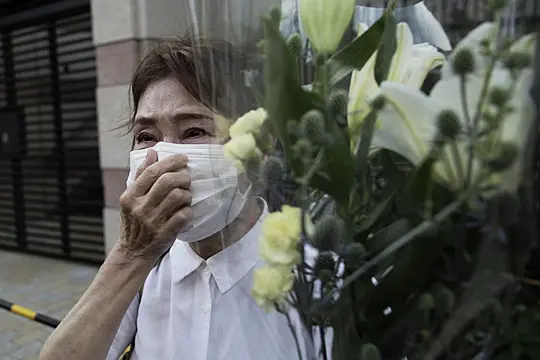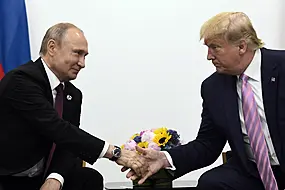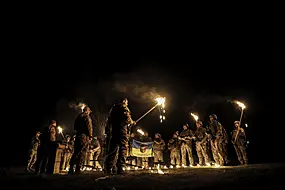Japan’s ruling party and its coalition partner have scored a major victory in a parliamentary election imbued with meaning after the assassination of former prime minister Shinzo Abe.
The Liberal Democratic Party (LDP) and its junior coalition partner Komeito raised their combined share in the 248-seat chamber to 146 on Sunday — far beyond the majority — in the elections for half of the seats in the less powerful upper house.
With the boost, prime minister Fumio Kishida stands to rule without interruption until a scheduled election in 2025.

That would allow Mr Kishida to work on long-term policies such as national security, his signature but still vague “new capitalism” economic policy, and his party’s long-cherished goal to amend the US-drafted post-war pacifist constitution.
A charter change proposal is now a possibility. With the help of two opposition parties supportive of a charter change, the governing bloc now has two-thirds majority in the chamber needed to propose an amendment, making it a realistic possibility. The governing bloc already has secured support in the other chamber.
Mr Kishida welcomed the major win but was not smiling, given the loss of Mr Abe and the hard task of unifying his party without him. In media interviews late on Sunday, Mr Kishida repeated: “Party unity is more important than anything else.”

He said responses to Covid-19, Russia’s invasion of Ukraine and rising prices will be his priorities. He said he will also steadily push for reinforcing Japan’s national security as well a constitutional amendment.
Mr Kishida and senior party politicians observed a moment of silence for Mr Abe at the party election headquarters before placing on the whiteboard victory ribbons next to the names of candidates who secured their seats.
Mr Abe, 67, was shot while giving a campaign speech in the western city of Nara on Friday and died of massive blood loss. He was Japan’s longest-serving political leader over two terms in office, and though he stepped down in 2020 was deeply influential in the LDP while heading its largest faction, Seiwakai.

Following the assassination, Sunday’s vote took on new meaning, with all of Japan’s political leaders emphasising the importance of free speech and defending democracy against acts of violence.
Mr Abe’s killing may have resulted in sympathy votes. Turnout on Sunday was around 52%, up about 3 points from the previous 48.8% in 2019.
“It was extremely meaningful that we carried out the election,” Mr Kishida said on Sunday. “Our endeavour to protect democracy continues.”
On the final day of campaigning on Saturday, party leaders avoided fist-bumps and other friendly gestures in close contact with the public — a sign of tightened security following Mr Abe’s assassination during a campaign rally.

Mr Abe’s body has been returned to his home in Tokyo’s upscale Shibuya, where many mourners, including Mr Kishida and top party officials, paid tribute. His wake and funeral are expected in coming days.
On Sunday, the suspect accused of his murder was transferred to a local prosecutors’ office for further investigation, and a top regional police official acknowledged possible security lapses allowed the gunman to get close to Mr Abe and fire his homemade gun at him.
The suspect, Tetsuya Yamagami, told investigators he acted because of Mr Abe’s rumoured connection to an organisation that he resented, police said, but had no problem with the former leader’s political views.

The man hated a religious group that his mother was obsessed about and that bankrupted a family business, according to media reports, including some that identified the group as the Unification Church.
Nara prefectural police chief Tomoaki Onizuka said on Saturday that problems with security were undeniable, that he took the shooting seriously and will review the security procedures.
Japan is known for its strict gun laws. With a population of 125 million, it had only 21 gun-related criminal cases in 2020, according to the latest government crime paper. Experts say, however, some recent attacks involved use of consumer items such as gasoline, suggesting increased risks for ordinary people to be embroiled in mass attacks.







